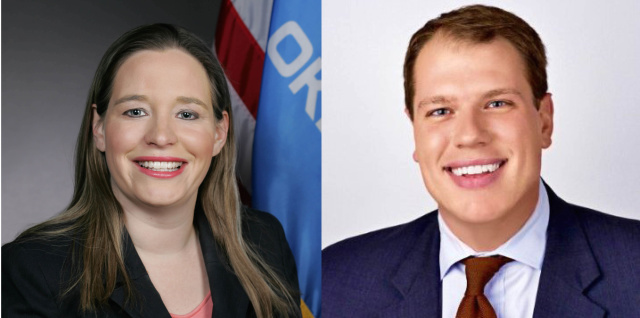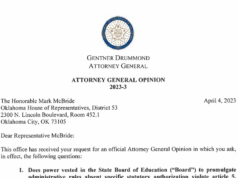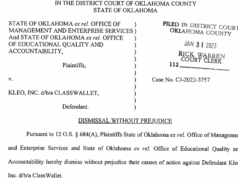An Oklahoma Board of Corrections member submitted his resignation letter to Gov. Mary Fallin’s office Tuesday because his wife heads up the Oklahoma multicounty grand jury that is expected to hear testimony about Oklahoma’s recent string of controversial executions.
James Matthew Tilly is married to Megan Tilly, an assistant attorney general who was named chief of Attorney General Scott Pruitt’s multicounty grand jury unit in January 2013. NonDoc learned of Mr. Tilly’s resignation letter Tuesday from Gov. Fallin’s spokesman, Alex Weintz, during an ongoing investigation of the Tillys’ juxtaposition.
On Oct. 1, Pruitt announced his office was launching an inquiry into the circumstances surrounding the postponed execution of Richard Glossip and prior execution protocol issues, which would include the mishandled execution of Charles Warner.
Multiple people have expressed concern to NonDoc that Megan Tilly’s involvement in the investigation poses a conflict of interest, even in light of her husband’s resignation.
“Oh hell yes that would be a conflict,” said OKC attorney Rex Travis. “To the extent that she is acting as a lawyer and she bears that family relationship with the DOC — which is the subject of the investigation — I think that would be a clear-cut conflict.”
Aaron Cooper, spokesman for Pruitt’s office, said he “can’t comment” on the multicounty grand jury or whether there has been discussion of Mrs. Tilly recusing herself from the inquiry.
“I can’t really comment or get into specifics,” Cooper said. In previous e-mails, he declined to name who was heading up the AG’s inquiry into the executions.
Mr. Tilly is a senior attorney with Devon Energy, according to his LinkedIn profile. His resignation letter was brief and direct:
The Attorney General’s office recently announced that it had begun an inquiry into executions and execution protocol in the state of Oklahoma. Given that the Department of Corrections oversees executions and execution protocols in Oklahoma and that my wife works for the Attorney General’s office, in order to avoid even the appearance of impropriety, I hereby submit my resignation as a member of the Board of Corrections.
It has been my pleasure to serve on the Board of Corrections and I appreciate being given the opportunity.
Mr. Tilly’s resignation, however, may not alter the nature of Mrs. Tilly’s potential conflict because her investigation centers around actions that occurred while her husband was serving on the board.
“This does not change the analysis, provided that the husband’s conduct prior to his resignation may still be scrutinized by the grand jury,” said Lawrence Hellman, dean emeritus of Oklahoma City University’s School of Law.
Hellman’s analysis was thick and based only on a summary of NonDoc’s reporting. He cited the Oklahoma Rules for Professional Conduct and the National District Attorneys Association’s “National Prosecution Standards,” which are considered best practices for the profession. In a nearly 700-word explanation “based on general principles of legal ethics,” Hellman outlined all the steps and boundaries Mrs. Tilly and Pruitt’s office would ethically need to meet to avoid appointing another assistant attorney general to lead the investigation.
And even that might not suffice. Hellman wrote, with the parenthetical portion included:
Where it is unreasonable to believe that the new lawyer can be unaffected by his/her colleague’s personal interest (because of friendship, familiarity, supervision, or the like), the appointment of a special prosecutor would be in order.
Hellman has taught numerous OCU School of Law classes on legal ethics, and he pointed out that a prosecutor’s “client” is the “State.”
The question boils down to whether there was informed consent from the AG, confirmed in writing, and, if so, whether a prosecuting attorney could reasonably believe that she could competently and diligently lead an investigation on behalf of the State when the investigation presents the possibility of finding fault with the Board of Corrections on which her husband sits. This is an objective standard. Under this standard, a prosecutor certainly would not be allowed to represent the State in prosecuting a relative who had already been indicted. Many would believe the same reasoning would apply to a prosecutor who was leading an investigation of events in which a family member is likely to have been involved. This view is consistent with Standard 1-3.3 d. in the NDAA National Prosecution Standards.
A source with knowledge of the situation told NonDoc that multicounty grand jury subpoenas have been issued to members of Gov. Fallin’s staff. Asked to discuss the multicounty grand jury, Weintz said he legally is not allowed to comment on it at all, and he did not confirm the subpoenas.
He did, however, say Gov. Fallin has hired her own independent legal counsel to advise her during the inquiry. The Oklahoman reported last week that the inquiry “could involve the state’s multicounty grand jury, which meets for three days later this month.”
The story also said the governor normally receives counsel from Pruitt, but Gov. Fallin noted “he is involved” in this situation.
Travis — who served on the Oklahoma County Bar Association’s “legal ethics committee” from 1985 to 1991 — said if Mrs. Tilly is involved in the attorney general’s DOC inquiry, it would be pretty much impossible to “read” the situation as anything other than a conflict of interest.
“She’s going to go home and say, ‘Boy, did we have a hell of a deal today. You ain’t gonna believe what these SOBs at the DOC are doing,'” Travis said. “[Her husband is one] SOB on the board of the DOC. That’s crazy. That’s just crazy, it seems to me.”
Travis’ comments came prior to Mr. Tilly’s resignation letter, as did this Pruitt statement addressing his office’s investigation:
While it is the policy of my office not to comment on pending investigations, as I stated last Thursday in a pleading to the Oklahoma Court of Criminal Appeals, we are evaluating ‘the events that transpired on September 30, 2015, ODOC’s acquisition of a drug contrary to protocol, and ODOC’s internal procedures relative to the protocol. The State has a strong interest in ensuring that the execution protocol is strictly followed.’ I want to assure the public that our investigation will be full, fair and complete and includes not only actions on September 30, but any and all actions prior, relevant to the use of potassium acetate and potassium chloride.
“Lawyers should be kind of like Caesar’s wife,” Travis said, “not just virtuous, but above reproach. It just looks bad. If it looks bad, it probably is bad.
“It’s sort of like sending a goat to guard the cabbages.”






















